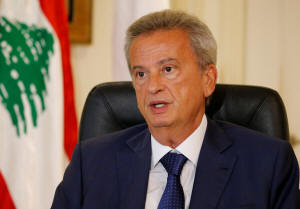Nobody running Lebanon, says central bank boss
 Send a link to a friend
Send a link to a friend
 [August 14, 2021]
By Laila Bassam and Nafisa Eltahir [August 14, 2021]
By Laila Bassam and Nafisa Eltahir
BEIRUT (Reuters) -Lebanon's central bank
governor said nobody was running the country as he defended his decision
to halt fuel subsidies that have drained currency reserves, saying the
government could resolve the problem quickly by passing necessary
legislation.
In an interview broadcast on Saturday, governor Riad Salameh pressed
back against government accusations that he had acted alone in declaring
an end to the subsidies on Wednesday, saying everyone knew the decision
was coming.
Part of Lebanon's wider financial meltdown, the steadily worsening fuel
crisis has hit a crunch point, with hospitals, bakeries and many
businesses scaling back operations or shutting down completely as fuel
runs dry.
Deadly violence has flared in fuel lines, protesters have blocked roads,
and fuel tankers have been hijacked this week.
The central bank's move to end subsidies, which will mean sharp price
increases, is the latest turn in the financial crisis that has sunk the
Lebanese pound by 90% in less than two years and pushed more than half
the population into poverty.

Salameh said Lebanon could recover but could not say how long that would
take. "So far you have nobody running the country," he told Radio Free
Lebanon.
The row between the government and Salameh has captured the failure of
the Lebanese elite to start tackling the meltdown.
The central bank has effectively been subsidising fuel and other vital
imports by providing dollars at exchange rates below the real price of
the Lebanese pound - most recently at 3,900 pounds to the dollar
compared to parallel market rates above 20,000 - eating into a reserve
which Salameh said now stood at $14 billion.
In order to continue providing such support, the central bank has said
it needs legislation to allow use of the mandatory reserve, a portion of
deposits that must be preserved by law.
"We are saying to everyone: You want to spend the mandatory reserve, we
are ready, give us the law. It will take five minutes," Salameh said.
The government has said fuel prices must not change, leaving fuel
importers, who say they cannot import at market rates and sell at
subsidised rates, demanding clarity.
The central bank and oil authority told importers to sell their stocks
at the subsidised rate of 3,900 pounds to the dollar, prioritising
hospitals and other essential functions.
[to top of second column]
|

Lebanon's Central Bank Governor Riad Salameh speaks during an
interview with Reuters in Beirut, Lebanon August 6, 2018.
REUTERS/Mohamed Azakir

"HUMILIATION OF THE LEBANESE"
Critics of the subsidy scheme say it has encouraged smuggling and
hoarding by selling commodities at a fraction of their real price.
Salameh said the bank had been obliged to finance traders who were
not bringing product to market, and that more than $800 million
spent on fuel imports in the last month should have lasted three
months.
Despite an unprecedented wave of imports, Salameh noted there was no
diesel, gasoline or electricity. "This is humiliation of the
Lebanese," he said.
Lebanese politicians have failed to agree on a new government since
Prime Minister Hassan Diab quit last August after the Beirut port
blast, since when he has continued as caretaker.
President Michel Aoun expressed optimism on the formation of be a
new government, saying he hoped there would be "white smoke" soon.
Salameh said Lebanon could exit its crisis if a reform-minded
government took office. The pound was "hostage to the formation of a
new government and reforms", he added.
The government has said ending subsidies must wait until prepaid
cash cards for the poor are rolled out. Parliament approved these in
June, with financing from the mandatory reserve, Salameh said, but
they have yet to materialise.

"When is the card? Let's assume in the best case after two or three
months ... we will spend $3 billion while waiting," Salameh said.
(Reporting by Nafisa Eltahir/Laila Bassam; Writing by Tom Perry;
Editing by Kirsten Donovan)
[© 2021 Thomson Reuters. All rights
reserved.] Copyright 2021 Reuters. All rights reserved. This material may not be published,
broadcast, rewritten or redistributed.
Thompson Reuters is solely responsible for this content. |